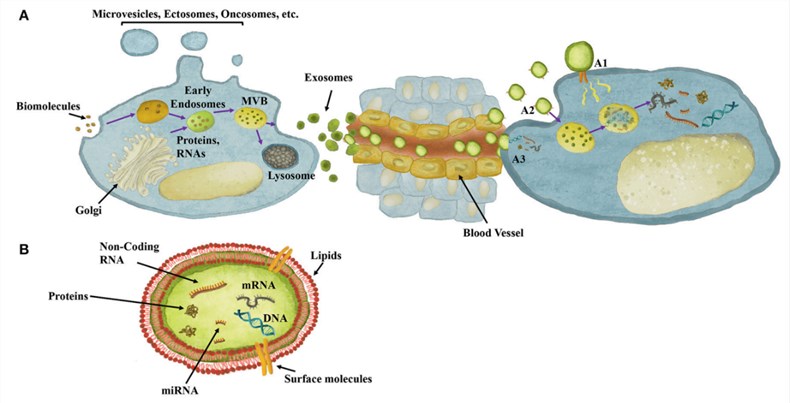Exosomal mRNA Sequencing Service
Overview Services Features FAQs
As a reputational service provider in the field of exosome research, Creative Biolabs is devoted to offering high-level and cost-efficient exosomal mRNA sequencing services for customers all over the world.
Background of Exosomal mRNA Sequencing
The different constituents and levels of mRNAs in exosomes closely associate with the physical and pathological conditions of originating cells. In contrast to the functional protein expression reflected by the cell transcriptome, the composition and content of the exosomal mRNA are quite different from that of the parental cell transcriptome and are closely related to intercellular communication and disease status. The characterization of exosomal mRNAs not only provides new insights into the exosomal functions, cell-cell communications, and cell pathophysiology but also contributes to the identification of exosomal mRNA biomarkers for disease diagnosis. Next-generation sequencing (NGS), or high-throughput sequencing, is a recognized and rapid technique for exosomal mRNA profiling and analysis.
 Fig.1 Exosomes role in cell-cell communication and their content.1
Fig.1 Exosomes role in cell-cell communication and their content.1
Exosomal mRNA Sequencing Service
Creative Biolabs has launched special exosomal mRNA sequencing services added by the well-constructed and powerful technology platform. Our standard one-stop exosomal mRNA sequencing service is summarized in the following steps:
-
Exosome preparation, including exosome isolation and purification.
-
Exosome total RNA extraction, mRNA separation, and mRNA sample QC.
-
mRNA library preparation and library QC.
-
Sequencing by Illumina sequencers.
-
Raw data processing, bioinformatics analysis, and report delivery.
 Fig.2 Exosomal mRNA sequencing service.
Fig.2 Exosomal mRNA sequencing service.
Advantages of Our Exosomal mRNA Sequencing Service
Creative Biolabs is confident in providing qualified exosome products and services for preclinical research based on seasoned experts and advanced platforms. We have a one-stop and standard exosomal mRNA sequencing service process to help you gain reliable data with high reproducibility.
-
To deliver gratifying service assistance, our team of expert scientists collaborates directly with clients.
-
Streamlined services from sample preparation to data interpretation.
-
Ensured timely delivery of thorough and repeatable results.
Please feel free to contact us for more information about our sample preparation criteria and quotes if you have any additional samples for our exosomal mRNA sequencing service at Creative Biolabs.
FAQs
Q: How does exosomal mRNA sequencing differ from other sequencing methods?
A: Exosomal mRNA sequencing specifically targets mRNA molecules found within exosomes, allowing researchers to analyze the RNA content derived from specific cell types or tissues. This technique provides a unique snapshot of cellular activity and can uncover biomarkers relevant to diseases such as cancer.
Q: What research applications is exosomal mRNA sequencing suitable for?
A: Exosomal mRNA sequencing is valuable for:
• Cancer research: Identifying cancer-specific biomarkers and understanding tumor progression.
• Neurodegenerative diseases: Studying disease mechanisms and potential diagnostic markers.
• Drug discovery: Assessing treatment efficacy and understanding drug resistance mechanisms.
Q: How can exosomal mRNA sequencing contribute to personalized medicine?
A: By analyzing exosomal mRNA, researchers can potentially identify personalized biomarkers that reflect individual disease states or treatment responses. This information can aid in developing targeted therapies and personalized treatment plans.
Reference
-
Maia, Joana, et al. "Exosome-based cell-cell communication in the tumor microenvironment." Frontiers in cell and developmental biology 6 (2018): 18. Under Open Access license CC BY 4.0, without modification.
For Research Use Only. Cannot be used by patients.
Related Services:

 Fig.1 Exosomes role in cell-cell communication and their content.1
Fig.1 Exosomes role in cell-cell communication and their content.1
 Fig.2 Exosomal mRNA sequencing service.
Fig.2 Exosomal mRNA sequencing service.









